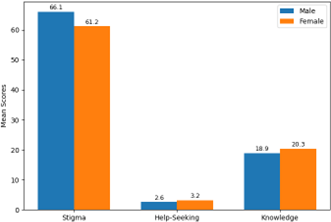Cultural Narratives, Social Norms, and Mental Health Stigma in Peshawar, Pakistan: Implications for Help-Seeking Behavior
Keywords:
Mental Health Stigma, Cultural Narratives, Social Norms, Pashtunwali, Help-Seeking Behavior, Emerging AdultsAbstract
Mental health stigma remains one of the most critical barriers to psychiatric care worldwide, particularly in conservative cultural contexts. This study examines the relationship between cultural narratives, social norms, and mental health stigma in Peshawar, Pakistan, with a specific focus on how these factors influence help-seeking behavior. Drawing on survey data from emerging adults (ages 18–29), the study employed descriptive statistics, regression analyses, and structural equation modeling (SEM) to investigate these dynamics. Results reveal that cultural narratives rooted in supernatural and religious explanations, as well as rigid social norms influenced by Pashtunwali, significantly predict stigmatizing attitudes toward mental illness. Gender disparities were evident, with men exhibiting higher levels of stigma and lower rates of help-seeking than women. Correlation and regression analyses underscored the mitigating role of mental health knowledge, which was negatively associated with stigma and positively linked to help-seeking behaviors. The SEM framework further highlighted stigma as a mediating mechanism between cultural/social constructs and psychiatric service utilization. These findings underscore the urgent need for culturally sensitive interventions in Khyber Pakhtunkhwa, particularly those that engage families, communities, and religious leaders in reframing mental illness as a treatable health condition. The study contributes to global debates on mental health by emphasizing the role of local cultural contexts in shaping stigma and advancing tailored approaches to improve access to care in low- and middle-income countries.

